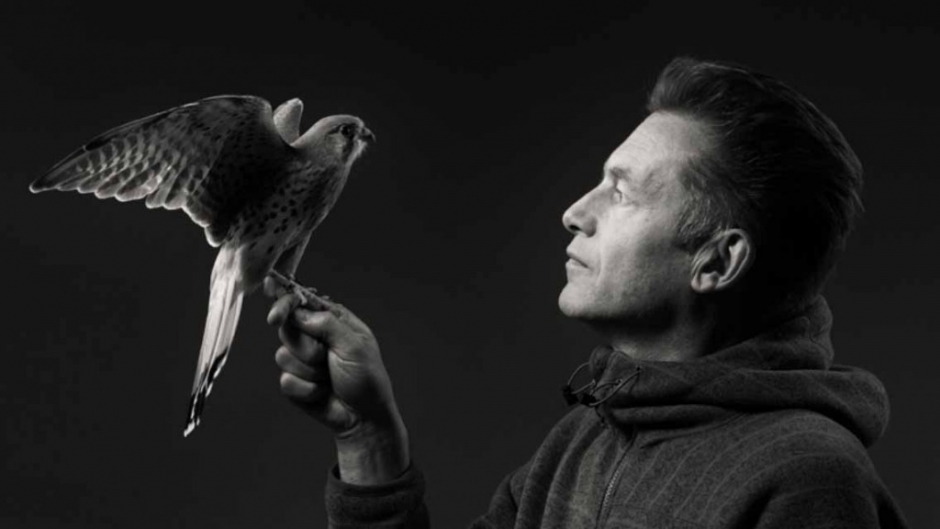An Evening with Chris Packham: Growing Up Wild, The Lowry; May 9, 2016
I arrived at the Lowry early and was lucky enough to spot Chris Packham in his natural environment – or at least, natural to most of his species – eating lunch at the Tower Coffee Shop. He didn’t notice me. Perhaps if I had more legs or wings or fur he might have, or perhaps if I were dressed like a punk rocker – two passions of his that send his heart soaring as well as his audience’s, with whom he is eloquently sharing them ‘In Conversation Around the UK’ to promote his newly released memoir, Fingers in the Sparkle Jar. Aptly titled for various reasons that we learned about during the talk, the book chronicles Packham’s life from childhood to early-adulthood as it was illuminated by an all-encompassing passion for nature. A collection of significant memories that sparkle with literary flair as well as vivid description, Packham’s memoir parallels the jars of tadpoles and minnows that so mesmerised him as a child, with their diamond eyes and pumping gills. The book has been highly praised as a lyrical and literary piece of nature writing, joining the likes of Helen Macdonald’s H is for Hawk.
Chris Packham is known for presenting the children’s TV show The Really Wild Show, and more recently Springwatch, Autumnwatch and the fantastic Weirdest Events series. Born in 1961 in Southampton, Chris’s interest in the natural world began early. At four years old Chris recalls persuading his father to take him to Bracklesham and Lyme Regis, where he would scour the coast for fossils, and later to Morecambe Bay for birdwatching. He stressed that his interest in the natural world expressed itself first as a desire to own and keep animals, often against their best interests, and later developed into a passion for observing animals in their natural environment and heading several conservation campaigns, most recently ‘Malta – Massacre on Migration’, which is tackling the ongoing mass shooting of endangered turtle doves, along with several other birds, in Malta.
Packham makes for a highly informative and often very humorous speaker, who delighted us with accounts of such quirky instruments of inquiry as the ‘tadpole spoon’, which he would use as a child, inexplicably even to himself, to transfer tadpoles from one jam jar to another in rapt fascination with their movements. This early desire to own often culminated in consumption, and he admits to having eaten several tadpoles during his lifetime (they tickle the tongue, have a gritty texture when chewed, and taste brackish and soily, in case you’re wondering). Interestingly, he described going back through his diaries during the process of writing the book and noticing in particular his sparing use of commas, a sense that he was too impatient and excited as a young writer to record his ideas and observations – a tendency he has since refined, revealing a passion too for the written word that has no doubt contributed to the critical success of his memoir.
The book focuses on his youth between the ages of six and sixteen, covering the period from 1966 to 1977. As well as vivid descriptions of his encounters with wildlife, including the heady days of visiting zoos without today’s health and safety regulations, Packham makes keen observations on the social and cultural influences of the time, in particular the punk rock movement of the 1970s which encouraged him to take ownership of his difference from his peers, and added a ‘rain of spittle’ to his sparkle jars. Painfully excluded during adolescence, Packham told us that his most significant relationship when he was fourteen was not with a girl, but with a kestrel, which he raised and trained on a patch of wasteland behind his home in 1975 – a year he describes as the happiest in his life: everything revolved around the bird. Having been blessed with a photographic memory, aiding the writing of his book, he described his memories of that year as confined solely to those moments spent with the kestrel – everything else is a blur.
Packham open-heartedly shared his passions, his highs and lows, and his thoughts on the benefits and challenges of having Asperger syndrome, for a heartfelt and inspiring talk. Interviewed by Patrick Barker, a butterfly enthusiast, Packham graciously turned the microphone on his interviewer at the end of the talk to ask whether the mild, wet winter has had a detrimental effect on butterflies this year (too early to tell). His next talk will be at the Natural History Museum in London and he will be touring until early August: http://www.chrispackham.co.uk/news/book-tour-this-spring.
Emma Rhys

